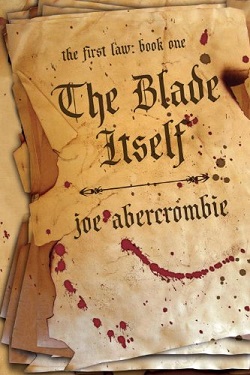Last week I talked about the A-Team. The comments derailed a bit after discussing Logen as B.A. Baraccus, when someone asked, who would actually play Logen in a film? My proposal, of course, was Mickey Rourke.
Why? Like Logen, Rourke has been through the wringer. Addiction, scarring, and hard living has left his face looking sufficiently rearranged to pull off Ninefingers. Not to mention, despite being 61 years old, he’s managed to keep his body in relatively good shape. While Logen isn’t that old, he’s probably closer to 40 than 30 and often described as being older looking than he is. Thus, Rourke. More importantly though, Logen and Rourke’s character from The Wrestler are similar enough that I’ve got proof he can pull it off.
So, if we’ve got Logen cast, who plays everyone else? I’m glad I asked!
Before we get to that topic though, I want to briefly explain why I’m not writing a standard reread post this week. Trust me. It all dovetails together at the end. The answer, in all honesty, is because on March 10, I ruptured my Achilles tendon. I’ve been in doctors’ offices, MRI machines, and consultations ever since. As you can imagine, I haven’t had a lot of time for reading and writing. In fact, I’m writing this now after deadline with my foot propped up on a chair and a huge bag of ice draped over it. I relate this life experience for two reasons—sympathy (because my wife seems uninterested in granting me this boon) and, more relevant, realization. The first reason seems self-explanatory. I fully expect the comments to deal exclusively with it. The second, however, requires some exposition.
When my tendon snapped, which by the way feels like someone dropping a 45 pound weight on your ankle from six feet in the air, I became vulnerable. From an emotional standpoint, I felt like a failure, recognizing I’m getting older and my best days, at least in terms of performance on a basketball court, are behind me. Not to mention running around with my children is off the table for a while and that hurts. Equally revelatory was my physical weakness. I cannot, in the near future, mow the lawn, protect my family, flee from a zombie, or bludgeon Sam Sykes. I am, until a medically licensed practitioner of orthopedics fixes me, vulnerable. I do not enjoy this feeling.
But.
It makes you realize some things, doesn’t it? And in this instance it helped me realize one of the deepest themes of Joe Abercrombie’s The Blade Itself. It’s a story of vulnerability. Logen and Ferro are physically impregnable, but emotionally fragile. Glokta is much the opposite. Jezal believes he’s immortal, as all youth does, but is a hairsbreadth from irrelevance (and/or death) at all times. Bayaz holds on to power because he’s scared of what he’ll become without it. This is hardly a groundbreaking observation, it’s all quite obvious actually, but I express it here because the larger point that needs to be made is fiction evolves with the reader.
The first time I read The Blade Itself I was in my mid-twenties. I could dunk a basketball with ease. I wasn’t married. I didn’t have children. There was nothing on earth I couldn’t do if I tried, or so I believed. I was Jezal dan Luthar. And, of course, he was the character I identified with. Particularly after Monday’s disaster I find myself more and more gravitating toward Logen and Glokta. Toward two people who are broken, but resilient. I am attracted to their vulnerabilities. Abercrombie has written a novel whose characters are not compelling for their power, but their weakness. And God damn does that resonate with me.
With that in mind, I want to return to the beginning of the post. I find that, when discussing casting a group of characters from a book, capturing the emotional aspects is endlessly more important than the physical. It’s why I described Mickey Rourke as the perfect choice for Logen. For that same reason I would cast Chris Pine as Jezal dan Luthar, Paul Giamatti as Sand dan Glokta, Michael Chiklis as Bayaz (also could get behind Idris Elba reprising Stringer Bell!), Emma Stone as Ardee, and Zoe Saldana as Ferro. Some of those choices can pull it off physically too, but in Giamatti’s case I’d have a hard time imaging he was ever a world class swordsman, but I can’t think of anyone more qualified to pull the Inquisitor’s unique blend of anger, self-involvement, depression, and rigid, albeit oddly aligned, moral compass.
My desire for these kinds of castings choices is perhaps also an example of my increasing age. I’m no longer convinced that everything in the world must conform to the image I imagine. Just as I no longer hold the expectation that my body will respond to the actions I request. It’s a little depressing, but part of the process, I suppose. Thankfully I still have my retirement years ahead of me where I can demand the world do things like we did in the good old days.
And that my friends is how you write an original casting call post.
Justin Landon runs Staffer’s Book Review where his posts are less on-color. Find him onTwitter for meanderings on science fiction and fantasy, and to argue with him about whatever you just read.










